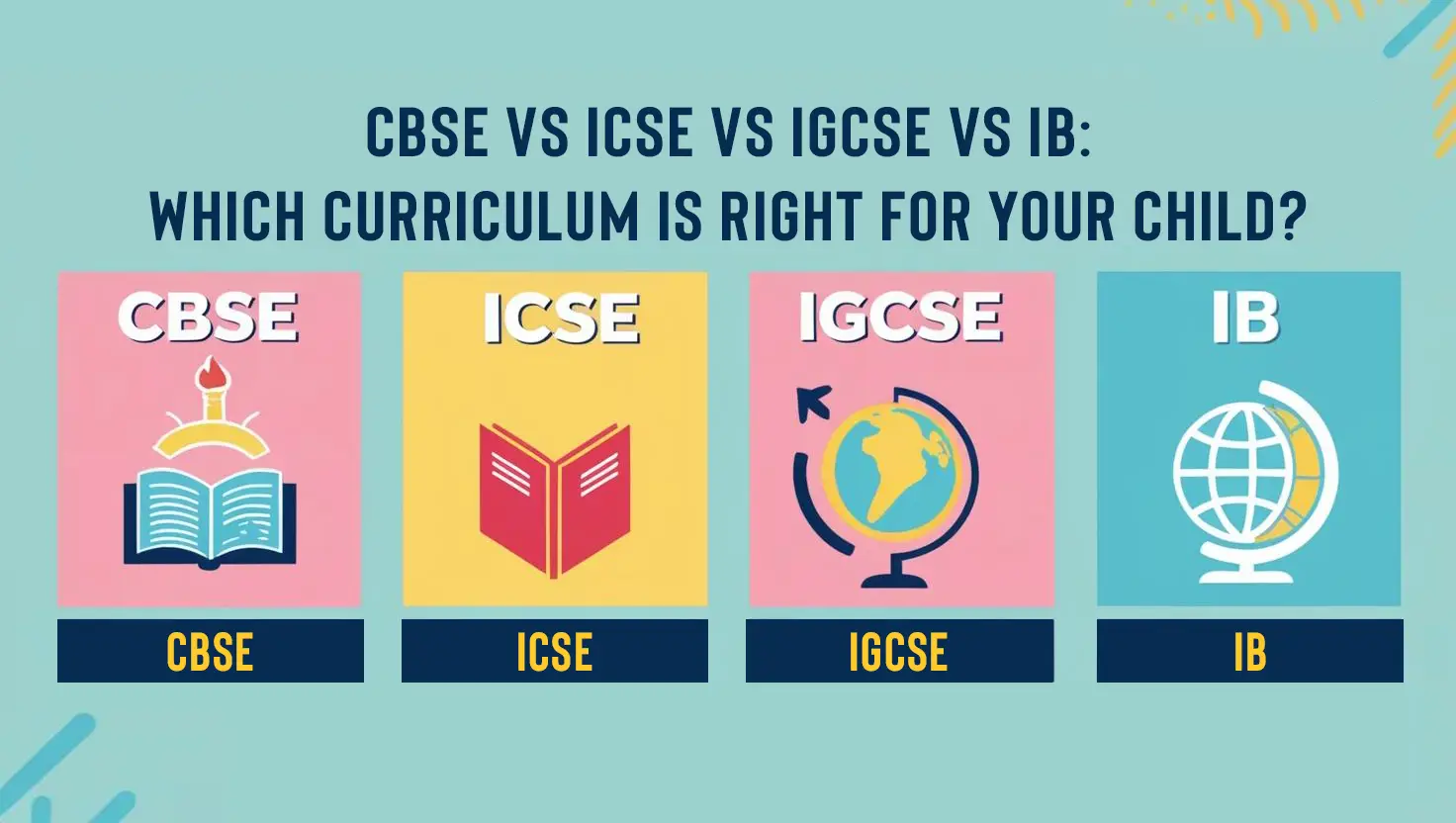CBSE versus ICSE versus IGCSE versus IB: Which curriculum is best for your child?
Choosing one curriculum out of many can be quite overwhelming, and rightly so. In India, parents often find themselves choosing among the four major boards, each with its pwn teaching methodologies, strengths, and focus areas. Finding the best-fit course for your child's learning environment can be a real dilemma.
So, how does one settle on any one of the options?
This guide simplifies everything for you — from what each board offers for a learning experience, the kind of student the curriculum suits best, and how the same choice can then impact further education and the career of your child.
Most Parent Questions:
- Which board provides the best overall education to my child?
- Does CBSE provide better support with respect to JEE/NEET coaching?
- Which board would make more sense if my child wants to be studying abroad?
- Let's dive deep into each of the options.
1. CBSE (Central Board of Secondary Education)
Best For: Students preparing for Indian competitive exams like JEE, NEET, or UPSC.
CBSE is the most popular board in India, with thousands of schools across the entire country that follow its standardized syllabus. This board is under the direction of the central government and is said to be closely aligned with the national-level entrance examinations.
Highlights:
- Emphasis on Math and Science
- Medium: NCERT textbooks
- Board examinations in Grades 10 and 12
- Teaching style: Traditional, textbook-oriented
✅ Pros:
- A help for engineering/medical aspirants
- Randomly available across India
- Affordable such that most Indian students know it
- Well-defined, linear syllabus
❌ Cons:
- Limits a student's choice of subjects
- Less focus on creativity and practical learning
- Pressure on students because of board examinations
- Not well-regarded elsewhere.
2. ICSE (Indian Certificate of Secondary Education)
Best For: Students who prefer to tread the line between enjoying a good balance of English, Humanities, and Sciences.
ICSE comes under CISCE and is known for being primarily rigorous and well-integrated. It surely gives extra weight to languages and literature, which makes it wonderful for a student who wants to tread the path of law, humanities, or perhaps international studies.
Highlights:
- Carrying a fairly equal weight-age to English, Science, Arts, and Languages
- Includes project work and internal assessments
- Heavily-loaded syllabus that leads to a deeper understanding of subjects
✅ Pros:
- Good at building English fluency (helpful for SAT, IELTS, TOEFL)
- Encourages analytical thinking
- Accepted in India and more so abroad
❌ Cons:
- Heavier than CBSE
- Availability of ICSE schools is fewer
- Usually more expensive than CBSE
- Not so good for JEE/NEET-focused students
3. IGCSE (International General Certificate of Secondary Education)
Best For: Students planning to study abroad and interested in a flexible international curriculum.
IGCSE, organized by the Cambridge International Examinations, enjoys global acceptance and nurtures aptitudes and skills applicable in the real world, rather than focusing on rote learning alone.
What Makes It Good?
- A wide range of subject choices
- Exams, Coursework, and Practical Assignments
- Freedom of Learning
✅ Advantages:
- Globally recognized by top universities
- Develops creative and critical thinking skills
- A personal Learning experience
- Less examination pressure
❌ Disadvantages:
- More expensive than CBSE and ICSE
- Not very suitable for Indian entrance examinations
- Very limited in availability (mostly metro cities)
- Recognition of IGCSE grades in Indian colleges may not be a sure thing at times
4. IB (International Baccalaureate)
Best For: Students wanting an international education, ample focus on development, and orientation towards global universities of repute.
IB aims to nurture inquiring, knowledgeable, and caring young people who are empowered to take action for a better world. Project-heavy curriculum fosters research, creativity, and leadership. Especially of interest to students applying abroad to Ivy League and otherwise top-ranking institutions themselves, the IB Diploma Program (Grades 11 & 12) prepares students well for university and for life.
Salient Features:
- No rigid subjects, students can combine areas of interest
- Independent research and presentation work forms the nucleus of assessment
- CAS (Creativity, Activity, Service), Theory of Knowledge, and the Extended Essay are part of the program
✅ Pros:
- Highly respected across the globe
- Encourages holistic, student-owned and controlled learning
- Prepares students well for university study and life skills
❌ Cons:
- Most expensive curriculum in India
- Very few IB schools in the country with the big cities
- Not exam-centric like Indian curricula such as JEE/NEET
- Heavy emphasis on student workload and atypical assessment practices
An Overview: Board Comparison
| Feature | CBSE | ICSE | IGCSE | IB |
|---|---|---|---|---|
| Best For | Indian Examinations | Balanced Learning | Foreign Studies Top Global | Universities |
| Subject Focus | Mathematics and Sciences | Equal focus on all | Customizable | Interdisciplinary |
| Assessment | Final Board Exams | Exams + Projects | Exams + Coursework | Continuous (Projects, Essays) |
| English Skills | Moderate | High | High | Very High |
| Global Recognition | Primarily in India | Recognized in India & Abroad | An Internationally Accepted Certificate | World-Wide Recognition |
| Cost | Low | Medium | High | Very High |
| Availability in India | High | Moderate | Very Limited to Metros | Very Limited (Metros Only) |
🧠 So, Which Board Should You Choose?
There is no universally accepted "best curriculum." Choice would depend on your child, their strengths, interests, and the goal he/she is aiming for.
The following is a quick guide:
- Go for CBSE boards if your child is interested in Indian competitive exams. Besides, another good feature is that it is available widely and is cost-effective.
- Choose ICSE if you value English capabilities, balance in the curriculum, and deeper engagement in the study.
- Opt for IGCSE if your child intends to pursue university abroad and is someone who thrives in flexible and skills-based learning approaches.
- Choose IB if you are out looking for a golden opportunity to land an international curriculum based on research—and wouldn't mind the costs involved or the heavy workload.
Final Thoughts
The most important aspect of all is where your child feels supported, challenged, and inspired. Consider their learning style, interests, and ambitions rather than simply academic pressure or peer choices. A curriculum should free your child, not shackle them.
No matter what road you take, remember — there is no wrong decision; only the right one for your child.




